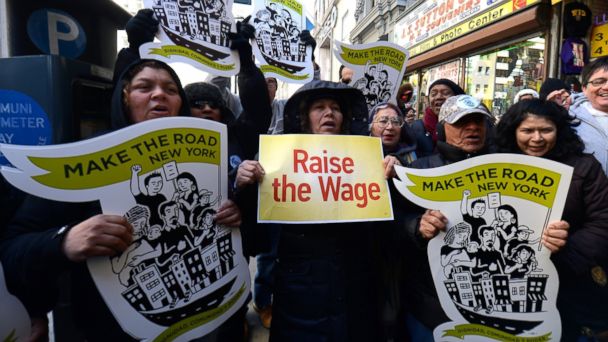5 Reasons Why Raising The Minimum Wage Is Going Nowhere For Now

Credit: Cem Ozdel/Anadolu Agency/Getty Images
The latest blow to President Obama's domestic agenda came today when the Senate failed to advance a measure that would have raised the federal minimum wage to $10.10.
With a vote of 54-42, Senate Republicans shelved one of the key initiatives the president urged Congress to pass in his state of the Union address this year.
Here's a look at five things that stand in the way of a $10.10 federal minimum wage right now.
1. Supporters Don't Have The Votes - Duh!
It should be pretty obvious from today's vote in the Senate that support isn't there to clear the procedural hurdles. 60 votes were needed for the measure to advance in the Senate, and Democrats were unable to get enough Republicans on board.
Sen. Bob Corker, R-Tenn, was the lone Republican to vote to advance the measure.
"I just think debating how you're going to improve the standard of living of Americans is an important thing to do," Corker told reporters. "It seemed to me a good opportunity for us to debate an issue that I think is very important to the American people."
2. Republicans Say It'll Cost Jobs
The main argument Republicans use in opposing the minimum wage hike is that it will decrease the number of jobs in the U.S. Republicans cite a Congressional Budget Office study that found a $10.10 federal minimum wage would reduce total employment by 500,000 workers in the second half of 2016
"Raising the minimum wage by 40 percent will not grow the economy. It will not create jobs. It will do the opposite," Sen. John Cornyn, R-Texas, said on the Senate floor .
Sen. Mike Enzi, R-Wy., said the measure would "shut the employment door on the very individuals they're trying to help."
But that same CBO study also says that 16.5 million people would see an increase in their earnings if a $10.10 minimum wage went into effect.
3. The GOP Sees It As A Political Ploy
Republicans see the Democratic push to raise the minimum wage as merely "political theater" to demonize conservatives during the mid-term elections.
"Let's talk about the 800 pound gorilla here in the Senate chamber. The truth is the president and Majority Leader Reid, they don't expect this bill to pass because they actually are very intelligent people and they know the facts," Sen. John Cornyn, R-Texas, said on the Senate floor.
Even if Republicans continue to cry foul, a recent ABC News/Washington Post poll found that 49 percent of people polled aligned with the Democratic party views when it came to raising the minimum wage. 33 percent said their opinion on whether the minimum wage should be raised was closer to that of Republicans.
4. Meet The Kochs
Or at least that's what Senate Majority Leader Harry Reid says. Reid blasted the billionaire conservative Koch brothers on the Senate floor ahead of the vote, saying they are at fault if the measure derailed.
"If Americans are searching for an answer why they would refuse to raise the minimum wage, they should look no further than the Republicans' billionaires benefactors, I repeat, billionaire benefactors the Koch brothers," Reid said. "Even though 75% of Americans support this legislation and our economy stands to profit from a wage increase, the will of the Koch brothers seems to be the top priority of my Republican colleagues."
5. It's Going Nowhere in the House
Even if Senate Democrats had all their members vote for the measure plus peel off five Republicans to clear a procedural hurdle (see above for why that's not likely to happen), a minimum wage hike likely has no momentum in the House of Representatives.
House Speaker John Boehner shot down the president's proposal to raise the minimum wage to $10.10 after the State of the Union.
"When it comes to the federal minimum wage, listen, I used to be an employer. When you raise the cost of something, you get less of it. And we know from increases in the minimum wage in the past that hundreds of thousands of low-income Americans have lost their jobs," Boehner said in January.
Instead, Boehner said the Senate should focus on passing bills to increase the number of jobs in this country.
"I've got a stack of better ideas, and they're the stacks of jobs bills that we've sent over to the United States Senate that they ought to be taking up and they ought to be passing," he said.